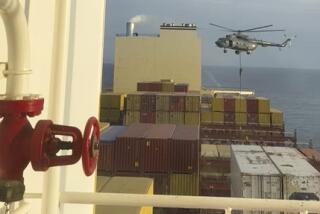Iran-Iraq War Raging Near Kuwait Border
- Share via
NICOSIA, Cyprus — Fighting raged in southernmost Iraq near the Kuwaiti border Wednesday, the third day of a major Iranian offensive in which both sides claimed to have killed or wounded more than 8,000 people.
Amid the conflicting battle reports, Arab foreign ministers gathered in the Iraqi capital. Baghdad radio said they will discuss “the new Iranian aggression, which poses a threat to the security of several Arab countries.”
The Iranian military, in a report monitored by Reuters news service in Manama, Bahrain, said its troops have reached the Kuwaiti border on the Persian Gulf, cutting off Iraq from the sea in what would mark its biggest victory in the five-year conflict, but Baghdad quickly denied the claim.
Pushing Along Coast
A Tehran war communique said Iranian troops who launched an offensive on the Al Faw Peninsula on Sunday night had pushed 30 miles farther along the coast and gained control of the eastern side of the Khawr abd Allah channel between Iraq and Kuwait.
Despite Iraqi denials, Iran also insisted that its forces have captured Al Faw, an Iraqi oil port wedged between the Kuwaiti island of Bubiyan and the disputed Shatt al Arab estuary on the northern tip of the Persian Gulf. Control of Al Faw would cut off Iraq’s sea access from the gulf to its naval base at Umm al Qasr to the northwest.
Iran’s official Islamic Republic News Agency, monitored in Cyprus, quoted military communiques as saying that Iranian forces surrounded the naval base, and charged for the first time in this offensive that Iraq used chemical weapons on several occasions in the Al Faw fighting.
Controlling Tanks, Pipelines
According to Iranian communiques, Iranian forces now control 20 square miles of the Al Faw area, including the main supply lines between the city and Umm al Qasr and 60 huge storage tanks and pipelines.
Most of Iraq’s southern oil installations have been knocked out by Iranian bombardment since the early months of the war.
The Iranian and Iraqi battle reports could not be verified independently, since foreign journalists are rarely allowed to visit the battlefronts.
More to Read
Sign up for Essential California
The most important California stories and recommendations in your inbox every morning.
You may occasionally receive promotional content from the Los Angeles Times.













